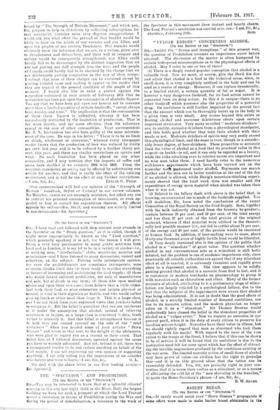" VULGAR ERRORS " CONCERNING ALCOHOL. (To THE EDITOR Or
THE " SPECTATOR.") Sis.—Amidst the " drums and tramplings " of this present war, the question of Prohibition assumes an importance never before attained. The discussion of the matter is often hampered by certain widespread misconceptions as to the physiological effects of alcohol. May I refer to one or two of these?
(1) There is a deeply rooted popular conception that alcohol is a valuable food. Now we must, of course, give the Devil his duo and admit that alcohol is a food in the technical sense, since, in small doses, it is very completely oxidized in the body and can be used as a source of energy. Moreover, it can replace dynamically, to a limited extent, a certain quantity of fat or sugar. It is however a very dangerous foodstuff, for its food action cannot be separated from its drug action. In this it is unique—there is no other foodstuff which possesses also the properties of a powerful drug. lts usefulness is still further impaired by the proved fact that the amount which can be thoroughly burnt up in the body in a given time is very small. Any excess beyond this exists as floating alcohol and exercises deleterious effects upon certain important structures. Very many so-called " moderate drinkers " are, in reality, excessive drinkers from a physiological standpoint, and this holds good whether they take their alcohol with their meals or not. Moderate drinkers of spirits may very easily exceed this physiological limit, and the same is true, though in a consider- ably lesser degree, of beer-drinkers. These properties so seriously limit the value of alcohol as a food that its practical value in thin respect—in health—is nil, and it can only be regarded as a luxury, while the risks attaching even to relative excess are important and no wise man takes them. I need hardly refer to the numerous well-known experiments which have been- carried out on the muscular work perforated under alcohol. Regiments can march farther and the men are in better condition-at the end of the day if no alcohol is allowed, while Durig's mountain-climbing experi- ments showed that the total work done was smaller and the expenditure Of energy more wasteful when alcohol was taken than
when it was not. - -
(2) Related to the fallacy dealt with above is the belief that, in brewing, an economical use is made of the foodstuffs supplied. You will doubtless, Sir, have noted the conclusions of the recent Committee of the Royal Society on the Food Supply. Beer, together with the milk indirectly obtained from the brewery by-products, contain between 28 per cent. and 59 per cent. of the total energy and less than 27 per cent. of the total protein of the original material, whereas if that material were utilized in the theoreti- cally best possible manner (i.e., not fed to cattle) about 71 per cent. of the energy and 68 per cent. of the protein would be recovered as human food. In addition, if beer-making were to cease, about thirty-one thousand acres of highly fertile land would be liberated.
(3) 'Very deeply ingrained also is the opinion of the public that alcohol is a "stimulant" of great value. The question whether alcohol in any circumstances acts as a stimulant is still hotly debated, but the problem is one of academic importance only, since practically all reliable authorities are agreed that if any stimulant effect at all is exerted, it is extremely transient and rapidly gives place to a depressant action. The view appears to be solidly gaining ground that alcohol is a narcotic from first to last, and it is customary in modern text-books on pharmacology to group it with narcotics such as chloroform and ether. Many of the former accounts of alcohol, attributing to it a preliminary stage of stimu- lation. are largely vitiated by a psychological fallacy, due to the fact that the subjects of the experiments were aware that alcohol was being administered. It is not in doubt that the good effects of alcohol, in a strictly limited number of diseased conditions, are due to its narcotic action, and the modern physician no longer relies on it as a " stimulant." Sir Thomas Browne would undoubtedly have classed the belief in the stimulant properties of alcohol as a " vulgar error." Now we require no narcotics in our present peril, when it is the duty of every citizen to preserve his faculties mirror-bright. Narcotics have their value in illness, but we should rightly regard that man as abnormal who took them regularly with his meals! With regard to the issue of the rum ration to the troops at the front, I believe that if this can be shown to be of service it will be found that its usefulness is due to the instinctive need felt for some agent which has the effect of obtund- lug the terrible impressions produced by the conditions existing in the war area. The limited narcotic action of small doses of alcohol may here prove of value—no civilian has the right to prejudge this—and it is on this ground alone that the ration can be reasonably defended. You, Sir, are perfectly right in your con- tention that it is worse than useless as a stimulant, or as a means of alleviating the cold lot of the " men shivering in the trenches," to quote the Home Secretary's phrase.—I am, Sir, &c., E W. ADAMS.






































 Previous page
Previous page